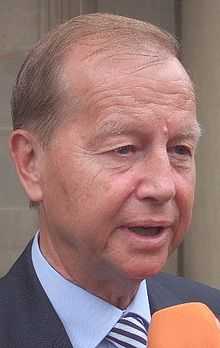Friedrich Bohl
| Friedrich Bohl | |
|---|---|
 | |
| Friedrich Bohl in 2008 | |
| Head of the Bundeskanzleramt | |
| In office 26 November 1991 – October 1998 | |
| Preceded by | Rudolf Seiters |
| Succeeded by | Bodo Hombach |
| Personal details | |
| Born | March 5, 1945 Rosdorf, Göttingen (district) |
| Nationality | German |
| Political party | CDU |
| Occupation | legal assistant |
Friedrich Bohl (born March 5, 1945 in Rosdorf, Göttingen) is a former German politician. From 1991 to 1998 he was the chief of the Federal Chancellery and Federal Minister for Special Affairs. He was the member of Fourth Kohl cabinet and Fifth Kohl cabinet. He succeeded Rudolf Seiters on 26 November 1991.
Biography
Bohl was born in Rosdorf on March 5, 1945. He graduated in law at the University of Marburg in 1964.[1] He finished the first and second legal state examination in 1969 and 1972 respectively. He was also a research associate at the Institute for Commercial and Economic Law at the University of Marburg. He started practising as a lawyer from 1972. He was ordered to notary in January 1999. From 1998 to March 31, 2009 Bohl was on the Executive Board of Deutsche Vermögensberatung (DVAG) responsible for the areas of Group Secretariat, public relations, associations and law.[2] Since March 31, 2009 he is Chairman of the Supervisory Board of Deutsche Vermögensberatung (DVAG). He became a member of the CDU's youth union in 1964.[1] From 1978 to 2002 he was the chairman of CDU's Marburg-Biedenkopf district association. He was a member of Bundestag from 1980 to 2002. From 1970 to 1980 he was a member of Hesse Landtag[1] and was the deputy chairman of the place's CDU association from 1978 to 1980. From 25 May to 26 October 1998 he was the head of the Press and Information Office of the Federal Government.[3] After the 1998 election he resigned from the federal government on 26 October 1998. He had also been member of the Konrad Adenauer Foundation and the Bureau of the European Union of Germany. He also served as the first parliamentary secretary of the CDU / CSU parliamentary group. From 26 November 1991 to 26 October 1998 he served as the Federal Minister for Special Tasks and Head of the Federal Chancellery.[4]
He was alleged to have destroyed files related to the party funding scandal during his tenure as the chief of the Federal chancellery.[2] At that time he had taken the political responsibility but denied that he had ordered to destroy the documents.[5] No evidences were found against him in the matter. He has served as the chairman of the supervisory board of the company Hessian craft AG. He was regarded as one of the closest confidants of then-Chancellor of Germany Helmut Kohl, and the phrase "No Kohl without Bohl" was used in German politics.[6]
In December 2013 he was unanimously elected the chairman of the Joint Board of the Max Planck Institute for Heart and Lung Research and the William G. Kerckhoff Foundation.[7] He has 4 children.[4]
He had once been called the "man with the oil can", the chancellor's "messenger and adviser, servant and executioner", "sort of prime minister" serving Helmut Kohl and "more equal than his cabinet colleagues".[8][9]
Awards
- 1990: Decoration of Honour for Services to the Republic of Austria[10]
- 1997: Great Cross of Merit of the Federal Republic of Germany
- 1998: Grand Cross of the Portuguese Order of Merit
See also
References
- ↑ 1.0 1.1 1.2 "Tabellarischer Lebenslauf: Friedrich Bohl". Konrad-Adenauer-Stiftung. Archived from the original on 8 July 2014. Retrieved 9 June 2014.
- ↑ 2.0 2.1 Lieb, Volfgang (3 May 2006). "Ex-Kanzleramtsminister Friedrich Bohl, heute Vorstandsmitglied der Deutschen Vermögensberatung (DVAG) darf in BILD für die Privatvorsorge werben" [Ex-Chancellor's Office Minister Friedrich Bohl, now a board member of Deutsche Vermögensberatung (DVAG) may advertise in PICTURE for the private pension]. Nachdenkseiten.de (in German). Archived from the original on 8 December 2012. Retrieved 9 June 2014.
- ↑ "Friedrich Bohl". chronikderwende.de. Archived from the original on 7 December 2011. Retrieved 12 June 2014.
- ↑ 4.0 4.1 "Friedrich Bohl". webarchiv.bundestag.de (in German). Retrieved 9 June 2014.
- ↑ "Kohl rejects bribe allegations". BBC News. 29 June 2000. Archived from the original on 8 July 2014. Retrieved 12 June 2014.
- ↑ "Friedrich Bohl feiert seinen 65. Geburtstag" [Friedrich Bohl celebrates his 65th birthday]. op-marburg.de (in German). Marburg. 5 March 2010. Archived from the original on 8 July 2014. Retrieved 9 June 2014.
- ↑ "Friedrich Bohl ist neuer Vorsitzender des Kerckhoff-Kuratoriums" [Friedrich Bohl is the new chairman of the Kerckhoff Trustees]. mpi-hlr.de (in German). Max Planck Institute. 12 December 2013. Archived from the original on 8 July 2014. Retrieved 12 June 2014.
- ↑ Simon Green; William E. Paterson (2005). Governance in Contemporary Germany: The Semisovereign State Revisited. Cambridge University Press. pp. 252–. ISBN 978-0-521-84881-7.
- ↑ Palmer, Von (21 August 1995). "Der Mann mit der Ölkanne SPIEGEL-Redakteur Hartmut Palmer über den Kanzler-Adlatus Friedrich Bohl" [The man with the oil can:SPIEGEL editor Hartmut Palmer for the Registrar-Adlatus Friedrich Bohl]. spiegel.de (in German). Archived from the original on 14 June 2013. Retrieved 15 June 2014.
- ↑ "Aufstellung aller durch den Bundespräsidenten verliehenen Ehrenzeichen für Verdienste um die Republik Österreich ab 1952" [List of all awarded by the Federal President of Honour for Services to the Republic of Austria from 1952] (PDF). Government of Austria. Retrieved 9 June 2014.
Bibliography
- Schönfeld, Ralf (2011). Bundeskanzleramtschefs im vereinten Deutschland: Friedrich Bohl, Frank-Walter Steinmeier und Thomas de Maizière im Vergleich [Federal Agency Head in a United Germany: Friedrich Bohl, Frank-Walter Steinmeier and Thomas de Maizière compared] (in German). Germany: Stuttgart. ISBN 978-3-8382-0116-0.
| ||||||||
|